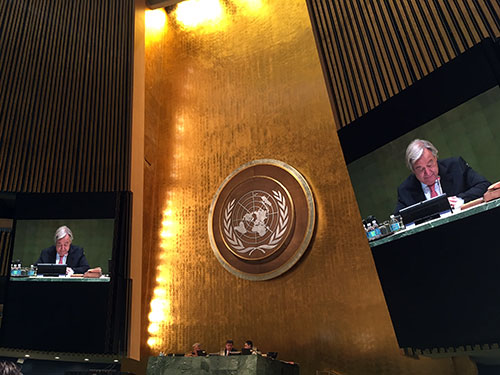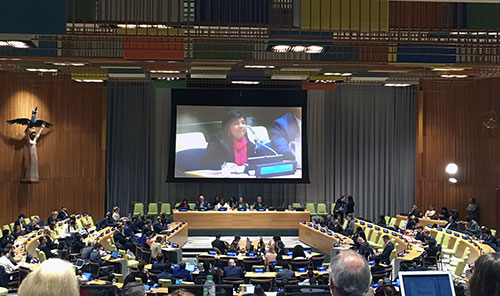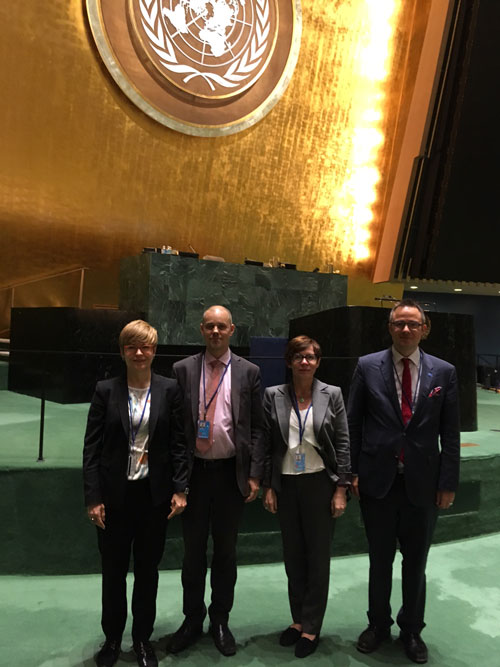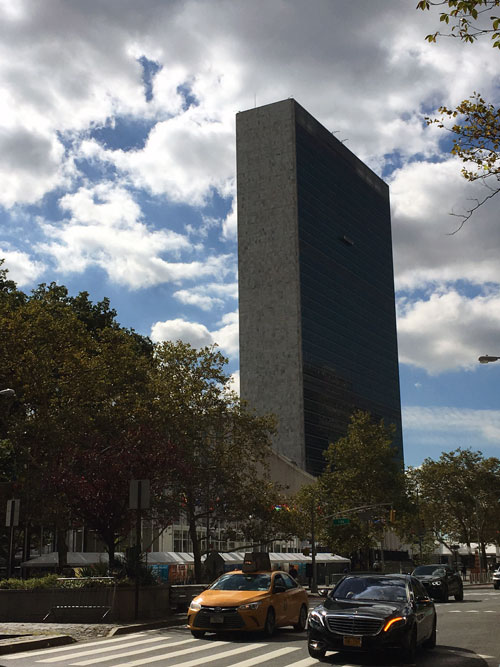The High-Level Meeting of the UN General Assembly on the Appraisal of the Global Plan of Action to Combat Trafficking in Persons convened in New York on 27-28 September, 2017.

The meeting adopted a Political Declaration , which aims to end human trafficking worldwide. A full account of the discussions at the High-Level Meeting can be found here. An analysis of the meeting by the Women's International League of Peace and Freedom is available here.
"Human trafficking needs to be a real priority for governments".
The UN Secretary General, Mr. Antonio Guterres
Many of the speakers emphasised the gendered nature of trafficking, as 79% of all victims are women and children (see the Global Report on Trafficking in Persons 2016). Many speakers also highlighted the need for a human-rights based, victim and survivor-centred approach to trafficking. The Secretary General, Mr. Antonio Guterres, emphasised that trafficking is intertwined with gender and discrimination, reminded Member States of the importance of addressing the root causes and also mentioned the rights of refugees to asylum and legal assistance as a means of countering trafficking. The High-Level meeting also gave voice to survivors of trafficking. Ms. Griselda Grootboom from South Africa gave a powerful account of her own story, of being trafficked from Cape Town to Johannesburg into sexual slavery, and her difficult journey of escape and recovery.
"I understand the pain of being a sex slave. I hope the Global Plan will take action not on paper, but in every township".
Griselda Grootboom, trafficking survivor, South Africa
Ms. Rani Hong spoke about her experience of being stolen from her mother at the age of 7 and sold into domestic trafficking, and then into internal adoption to North America. Her trafficker was an accountant in a manufacturing company in India, and Ms Hong has developed the Freedom Seal as a monitoring mechanism for ending forced labour in supply chains (read more).

"The numbers are so horrific, we forget the one. We need to turn this economic and geopolitical issue into a person".
Ms. Rani Hong, trafficking survivor, United States
Many of the statements by Member States highlighted the development of national structures to counteract trafficking. In addition to introducing specific legislation, a number of countries have established national action plans, national referral mechanisms, national coordination mechanisms, specialised units, and training for authorities and other key actors. Some countries called for the need to establish transnational referral mechanisms to strengthen the support to victims across borders. Many countries have established specialised shelters and support mechanisms to victims. Several countries also announced their support to the UN Trust Fund to victims of trafficking.
The link between trafficking and terrorism was raised by some speakers.
"Terrorist networks use women’s bodies as currency in the economy of war".
SG’s special representative on armed conflict
Some countries linked the prevention of trafficking to broader efforts. Canada highlighted its new code of conduct for procurement, which aims to ensure that public procurement is free from human trafficking (read more) and Germany referred to its National Action Plan of 2016 on Business and Human Rights (read more).
"Trafficking is an economic issue; we need to get businesses involved in countering it".
Representative of Mexico
In one of the side events the Dutch National Rapporteur, Ms. Corinne Dettmeijer presented a new study, carried out in the Netherlands in cooperation with UNODC. The study uses the Multiple Systems Estimate model to estimate the so-called “dark figure" of trafficking. According to the study, Dutch girls of the age 12-17 and foreign residents are at heightened risk of becoming victims of trafficking. The study also highlights that victims of domestic sex trafficking, in particular, remain undetected. The study concludes that more efforts therefore need to be put into the detection of domestic sex trafficking victims, minors, and female victims of cross-border trafficking for non-sexual exploitation.
------------------------------------------------------------------------------------------------------------------------------------
In addition to the UN meeting, HEUNI met with representatives of the Department of Labor at the New York State. The discussions focused on the work done to counteract labour trafficking in New York. In 2016 there were a total of 256 cases of trafficking identified in the state of New York, and 25% of these were labour-related. Labour trafficking cases rarely come through the courts, as most cases proceed as civil complaints rather than as felonies/crimes.

